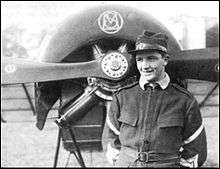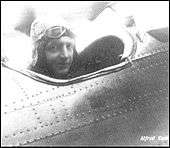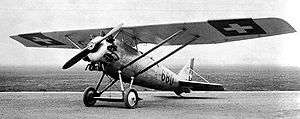Alfred Comte
| Alfred Comte | |
|---|---|
 Alfred Comte in August 1914 | |
| Born |
4 June 1895 Delémont, Switzerland |
| Died |
1 November 1965 (aged 70) Zürich, Switzerland |
| Nationality | Swiss |
| Occupation | Pilot, entrepreur, engineer |
| Known for |
Aviation entrepreneur (Ad Astra Aero S.A.) construction of civilian and military aircraft |
Alfred Comte (4 June 1895, in Delémont – 1 November 1965, in Zürich) was a Swiss aviation pioneer. He was active as a pilot, photographer, instructor, also as one of the first aviation entrepreneurs and was successful in the construction of civilian and military aircraft.

Life
At the age of 15 Alfred Comte built a motorized bicycle. Comte obtained his private pilot's license in 1913 from the Aéro-Club of France. At the start of World War I, he served as a pilot in the Swiss military, then as an instruction officer for military aviation. In 1916 he carried out night flights from Delémont to prevent air space violations: Porrentruy had been bombed by aircraft of unknown origin. Germany and France consented to a Swiss proposal to mount light-beacons along the Swiss-German-France borders to prevent further mistakes.[1]
On 5 November 1919 he co-founded an airline providing aerial photography and passenger flights, Comte, Mittelholzer, and Co. In 1920, this company merged with the financially stronger Ad Astra Aero. Alfred Comte was a frequent participant in exhibition events for acrobatic flying and pioneered the route from Zürich to London. In December 1920 he established a school of aviation of his own, using flying boats among them six Austrian Lohner TL-1917/R aircraft (CH-61 to CH-65) from a base in Oberrieden on the shores of Lake Zürich. During World War II, Comte returned to military aviation duties and was promoted to captain. From 1946 to 1950 he once again managed a school of aviation and was also involved in establishing the private airfield Wangen-Lachen on the southern shore of lake Obersee. He finally retired from flying and died in 1965 in Zürich.
Alfred Comte Schweizerische Flugzeugfabrik
Between 1923 and 1935, Alfred Comte concentrated on airplane design and construction in his own company, Alfred Comte Schweizerische Flugzeugfabrik. In all, around 40 aircraft were built, with an additional eight Fokker D.VII under license for the Swiss Air Force. The company had a good reputation, but financially it was not successful, and a fire destroyed some of Comte's designs. The Great Depression hit the small business hard; it could not be saved even by switching to the production of tubular steel furniture, and in 1935 filed for bankruptcy.
From 1923 to 1935, Alfred Comte designed and built several aircraft:
- Wild 43
- (1923–26), training purpose, 6 built and exported to China and Colombia
- Wild X
- (1927/28), fighting and observing purpose, 8 built and exported to Colombia
- AC-1
- (1926), fighter, 1 built, Swiss Air Force preferred in an evaluation to buy Dewoitine D.27
- AC-2
- 2-seat sport biplane with a 60 hp engine, not built [2]
- AC-3
- (1929/30), transport and bombing purpose, 1 built
- AC-4 Gentleman
- (1928–30), two-seat sport/training aircraft, 11 built, used by Swiss Air Force and others
- AC-5
- 6-seater with a 200 hp Wright engine, not built [2]
- AC-6
- 2-seat biplane with a 200 hp Wright Whirlwind engine for training or a 400 hp Gnome-Rhone Jupiter for military use, not built [2]
- AC-7
- 2-seat high-wing trainer with a 500 hp Gnome-Rhone Jupiter engine, not built [2]
- AC-8
- (1929/30), passenger aircraft, 3 built, probably one (or AC-4) used by Ad Astra Aero
- AC-9
- tri-motor airliner, not built [2]
- AC-10
- development of the AC-1 with a 480 hp Gnome-Rhone Jupiter engine, not built [2]
- AC-11-V
- (1931), liaison and survey aircraft, 1 built, rejected by Swiss Air Force
- AC-12 Moskito
- (1931/35?), airliner, 8 built
Literature
- Roland Eichenberger: Die Flugzeuge von Alfred Comte, Liebefeld 1968.
- Roland Eichenberger. Alfred Comte (1895–1965), in: Schweizer Pioniere der Wirtschaft und Technik, Vol. 46. Glarus Verlag, Zürich 1987.
References
External links
| Wikimedia Commons has media related to Alfred Comte. |
- François Kohler: Comte, Alfred in German, French and Italian in the online Historical Dictionary of Switzerland, 19 December 2003.
- Walter Dürig: Zur Geschichte der schweizerischen Eigenentwicklung von Flugzeugen (Digitalisat, 69 KB) (German)
